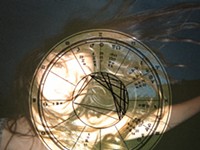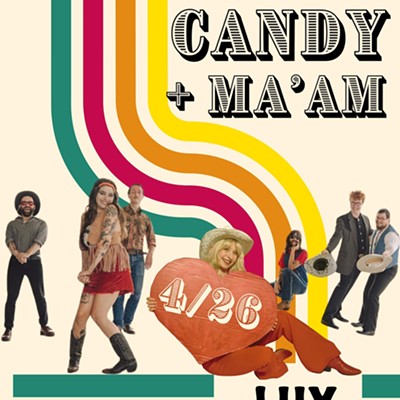[
{
"name": "500x250 Ad",
"insertPoint": "5",
"component": "15667920",
"parentWrapperClass": "",
"requiredCountToDisplay": "1"
}
]
Listening to jazz guitarist Vic Juris play one crystal-clear post-bop solo after another, it's hard to imagine that his love affair with the instrument began with the raucous, distorted wails of hard rock heroes.
But during his teen years in Parsippany, New Jersey, in the mid to late 1960's, Juris was enamored of the guitarists he heard on the radio, rockers like Jimi Hendrix and Eric Clapton.
"It was a really interesting period for a teenager to grow up in," says Juris, who honed his technique imitating the stars. "I picked it right up," he says. "I was in bands in high school playing Hendrix and Clapton solos."
But the guitar teacher he began to take lessons with had a different idea. He started loaning Juris jazz records. Pretty soon the young guitarist discovered a new world with new heroes: Johnny Smith, Wes Montgomery, Tal Farlow, and Barney Kessel. But he didn't leave rock completely.
"Other players were starting to come along who were combining things, like Larry Coryell and John McLaughlin, so I kind of gravitated toward those guys," says Juris.
In fact Juris, who plays at the Eastman School of Music's Jazz Café Friday, got so immersed in jazz guitar that he decided to skip college, a decision that did not sit well with his dad — a police officer — and mom.
"I don't think they were too thrilled," says Juris. But by the age of 20, he was working professionally with organist Don Patterson, not to mention gigs with groups like The Drifters and The Shirelles. Touring acts often needed a guitarist who could join the band cold and sightread the music. They could count on Juris.
By the mid-1970's, Juris' reputation got him gigs and recording dates with Mel Tormé, Richie Cole, and others. Over the next several decades he played with some of the greatest names in jazz, including Dizzy Gillespie.
"That was a great experience," says Juris. "I got to play his original music. He was a wonderful person, very giving and very willing to share his knowledge with younger players."
Saxophonist Phil Woods became a mentor when Juris toured with his band. That was when he began to use his guitar as a "second horn," a role he continued in the band of another saxophonist, Dave Liebman. He explains:
"When I first joined Dave's band he had a piano player, so I was playing counter melodies or second-line harmony parts the way a trumpet player would with a saxophone. Later on he decided to cut it down to a quartet, so I became the second horn and the piano player."
If that sounds like a stretch, Juris views the guitar as one of the most versatile instruments in jazz. "The original role of the guitar was vocal accompaniment," says Juris. "But with amps, the guitar has more color possibilities than a piano has, even though you can't play as many notes."
Among the legendary bands he brought his multi-instrumental guitar sound to, Jimmy Smith's organ trio stood out for several reasons.
"The older organ players, they would play the bass lines and solo and you were expected to fill in all the chording," says Juris. As for Smith himself: "He was a tough guy to work for. He didn't like when you got more applause than he did. You just had to learn to stay on his good side."
He had a better experience with the great percussionist Chico Hamilton, who understood the possibilities of the guitar. In fact, says Juris, "He was the first guy to use guitar instead of piano."
Juris's guitar prowess has even led to collaborations with one of his early guitar heroes. Beginning in the 1980's he became Coryell's frequent duo partner. They have continued to work together to this day.
Despite playing with a Who's Who of jazz greats, Juris most values the chances he gets to explore his own musical vision.
"The best thing for me has always been my own group, my trio with Jay Anderson on bass and Adam Nussbaum on drums," he says. "We play every month at 55 Bar in New York." He's also got a new quartet CD coming out featuring Tim Hagans on trumpet.
The trio and quartet perform jazz standards but they also play Juris's own tunes, which sometimes originate through improvisations.
"I'll record a lot of stuff, listen back, and I may discover something and develop it from there," says Juris. "Usually the best stuff happens when you don't expect it to happen. If you try to sit down and write something, that's really tough to force.
"The quest is to always play something you've never played before," he says. "I have total respect for the Cole Porters and the George Gershwins; that stuff has lasted all these years. But the jazz player is always looking to re-harmonize or change things around a little bit."
Juris points out that some old-school composers, notably Rochester's own Alec Wilder, didn't like it when jazz players took liberties. Wilder, he says, "made a comment: 'the next thing you know they'll be changing Shakespeare.'"
When he's not touring or recording, Juris enjoys listening to classical works, especially the music of Ravel and Debussy. He also loves the work of virtuosos like pianist Vladimir Horowitz, guitarist Andrés Segovia, and violinist Itzhak Perlman. And, of course, he never tires of his favorite jazz guitarists, Wes Montgomery and Pat Martino. But he hasn't forgotten the artists who got him going in the first place.
"I always go back to my roots — Hendrix — and I was just listening to Cream," says Juris. "They say you can't go home again, but I think it's possible."
Speaking of...
-
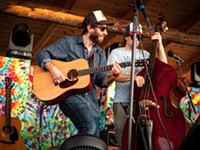
Live concerts return to Rochester — an overview
Jul 21, 2021 -

Party in the Park concert series returns in July
Jul 2, 2021 -
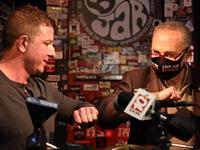
As the Bug Jar turns 30, its stage remains silent
May 19, 2021 - More »
Latest in Music Features
More by Ron Netsky
-
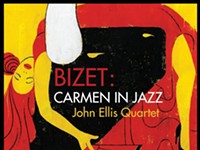
Album Review | 'Bizet: Carmen in Jazz'
Mar 26, 2024 -
'To Swing Is the Thing" by Mike Melito
Aug 10, 2023 - More »



